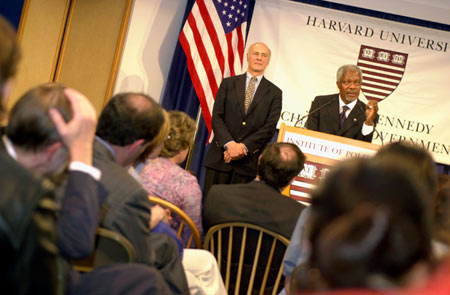Globalization and self-help

With globalization linking their fates, the developed world cannot afford to leave the developing world behind, UN Secretary General Kofi Annan said Wednesday (April 24), urging support for African efforts to help themselves.
“Globalization as we know it today is not sustainable. It needs to be less disruptive and more equitable. It needs to support not only private wealth, but also public good,” said Annan, who delivered the 2002 Godkin Lecture to a packed ARCO Forum at the Kennedy School of Government.
In a 25-minute speech, Annan described a continent mired in poverty and fighting an AIDS epidemic that has infected 28.1 million, with 3.4 million new cases in 2001 alone. Foreign aid to African nations declined in recent years, with a $1 billion drop from 1998 to 1999. Civil strife continues to plague the continent.
Still, Annan said there’s cause for hope. More and more African nations are embracing democracy and, more importantly, the citizens of those nations are beginning to see democracy and free, fair elections as their right. That attitude can be a powerful force for the survival of democratic governments in those nations.
In addition, Annan said, African leaders are taking action and speaking out on AIDS and are increasingly becoming involved in resolving regional disputes. They’ve taken coalition-type approaches to conflicts in the Democratic Republic of the Congo, in the border dispute between Ethiopia and Eritrea, and in the civil war in Sierra Leone.
Central to any progress made by any African country is a stable government with effective institutions, Annan said. Toward that end, the spread of democracy across the continent is a hopeful sign, though democracies formed by ethnic majorities can still oppress ethnic minorities in a nation. Hand in hand with a democratically elected government, he said, nations need the companion institutions of a free press, an independent judiciary, and stable political parties.
“All our work for development and peace has shown us that if governance is neglected, then we are building on sand,” Annan said.
Increasing economic growth rates are critical, Annan said. For that to happen, trade restrictions that block markets in the developed nations, such as subsidies for local agricultural products or technical requirements for imported goods, will have to be eased.
“Africans would much rather trade themselves out of poverty than accept handouts,” Annan said.
Even now, too many African nations are either caught up in war or have recently emerged from strife. The warfare has exacted a large toll on African nations, Annan said, destroying much-needed infrastructure and displacing 17 million people.
“In Africa today, challenge and opportunity are two sides of the same coin,” Annan said. “Africans are more aware of this than ever before and are genuinely engaging this on their own terms.”
Annan cited several areas of cooperation, including the formation of the New Partnership for African Development, which is at the forefront of several cooperative efforts with partners both inside and outside Africa.
“The partnerships and programs that will succeed in responding to Africa’s future needs must focus on helping Africans improve their own capacity and institutions,” Annan said. “Africa’s future will be determined by Africans enabled and empowered to build a future of democracy and prosperity based on the rule of law and good governance. … The reality of globalization has made it clear we cannot ignore the challenges and crises of other parts of the world – and if we do so, we do so at our own peril.”




